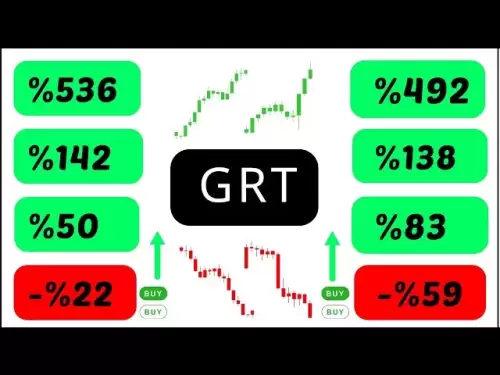-
 Bitcoin
Bitcoin $107,467.9126
1.26% -
 Ethereum
Ethereum $2,447.5288
-0.12% -
 Tether USDt
Tether USDt $1.0005
0.00% -
 XRP
XRP $2.1921
0.13% -
 BNB
BNB $647.2897
0.50% -
 Solana
Solana $144.8627
-0.37% -
 USDC
USDC $0.9996
-0.03% -
 TRON
TRON $0.2732
0.10% -
 Dogecoin
Dogecoin $0.1652
-0.18% -
 Cardano
Cardano $0.5700
-2.87% -
 Hyperliquid
Hyperliquid $37.0274
-1.81% -
 Bitcoin Cash
Bitcoin Cash $484.6957
0.19% -
 Sui
Sui $2.7354
-2.19% -
 Chainlink
Chainlink $13.1727
-1.49% -
 UNUS SED LEO
UNUS SED LEO $8.9978
-0.04% -
 Stellar
Stellar $0.2421
-2.33% -
 Avalanche
Avalanche $17.5633
-3.51% -
 Toncoin
Toncoin $2.8476
-1.94% -
 Shiba Inu
Shiba Inu $0.0...01166
-0.56% -
 Litecoin
Litecoin $85.1071
0.09% -
 Hedera
Hedera $0.1502
-2.96% -
 Monero
Monero $310.2774
-1.64% -
 Dai
Dai $0.9999
-0.01% -
 Polkadot
Polkadot $3.3584
-1.88% -
 Ethena USDe
Ethena USDe $1.0003
-0.04% -
 Bitget Token
Bitget Token $4.4443
2.90% -
 Pi
Pi $0.6242
14.04% -
 Uniswap
Uniswap $6.9774
-2.86% -
 Pepe
Pepe $0.0...09535
-5.05% -
 Aave
Aave $256.7574
-3.35%
What are the common types of blockchain wallet addresses?
Blockchain wallet addresses vary across networks like Bitcoin, Ethereum, and Litecoin, each using unique formats and cryptographic methods for secure transactions.
Jun 13, 2025 at 10:56 pm
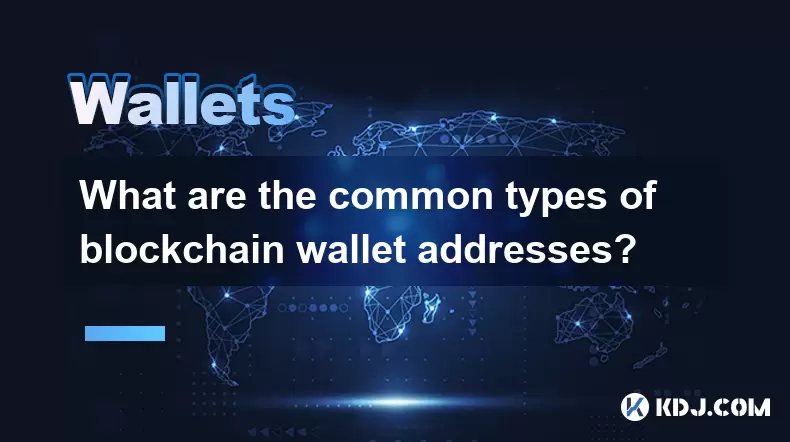
What Are the Common Types of Blockchain Wallet Addresses?
Blockchain wallet addresses are unique identifiers that enable users to send and receive cryptocurrencies securely. Each blockchain network has its own standards for generating these addresses, which vary in format, structure, and cryptographic algorithms.
Bitcoin (BTC) Wallet Addresses
Bitcoin uses several address formats depending on the type of transaction and wallet compatibility. The most common types include Legacy (P2PKH), SegWit (P2SH-P2WPKH), and Bech32 (Native SegWit).
- Legacy (P2PKH): These addresses start with the number "1" and were the original Bitcoin address format. They are longer and less efficient due to higher transaction fees.
- SegWit (P2SH-P2WPKH): Starting with "3", this format was introduced to improve scalability by separating signature data from transaction data.
- Bech32 (bc1q...): Native SegWit addresses begin with "bc1" followed by a "q". This format offers lower fees and better error detection capabilities.
Each of these formats is generated using Elliptic Curve Digital Signature Algorithm (ECDSA) and hashing functions like SHA-256 and RIPEMD-160.
Ethereum (ETH) Wallet Addresses
Ethereum addresses are derived from the public key using the Keccak-256 hashing algorithm, resulting in a 40-character hexadecimal string prefixed with "0x". For example: 0xAbCdef1234567890abcdef1234567890ABCDefgh.
One notable feature of Ethereum addresses is case sensitivity support via checksums, introduced in EIP-55. This allows mixed-case letters to help detect typos when entering an address manually.
- Externally Owned Accounts (EOA): Controlled by private keys and used for standard transactions.
- Contract Accounts: Generated by deploying smart contracts and controlled by their code logic.
Users can generate Ethereum addresses using wallets such as MetaMask, Trust Wallet, or hardware wallets like Ledger or Trezor.
Litecoin (LTC) and Similar Altcoins
Litecoin follows a similar structure to Bitcoin but uses different prefixes:
- Legacy (P2PKH): Starts with "L".
- SegWit (P2SH): Begins with "M".
- Bech32: Uses the prefix "ltc1".
These variations are primarily due to differences in version bytes during the Base58Check encoding process. Other altcoins like Dogecoin and Bitcoin Cash also follow similar conventions, with unique prefixes and hashing mechanisms.
Generating a Litecoin address involves:
- Creating a private key using ECDSA secp256k1
- Deriving the public key
- Hashing it with SHA-256 and RIPEMD-160
- Adding the appropriate version byte before applying Base58Check encoding
Ripple (XRP) Wallet Addresses
Ripple's wallet addresses start with the letter "r" and are encoded using Base58Check, similar to Bitcoin. However, the internal structure differs significantly.
The generation process includes:
- Generating a seed (secret key)
- Deriving a family seed
- Using it to create a public/private key pair
- Encoding the public key into an XRP address with specific version bytes
An example of an XRP address looks like: rHb9CJAWy18p6k6p3kwjGn1fD6A99712v.
Unlike Ethereum, XRP does not use smart contract accounts; all addresses are user-controlled.
Binance Smart Chain (BSC) Wallet Addresses
Binance Smart Chain addresses are compatible with Ethereum’s format, starting with "0x" and being 40 characters long. However, they operate on a separate chain with faster transaction speeds and lower gas fees.
Key points:
- Use the same ECDSA and Keccak-256 hashing methods as Ethereum
- Can be managed using Binance Chain Wallet, Trust Wallet, or MetaMask (with BSC network added)
To interact with BSC, users must switch their wallet network settings to Binance Smart Chain Mainnet or Testnet, depending on the use case.
Frequently Asked Questions (FAQ)
Q: Can I reuse the same wallet address across different blockchains?
No, each blockchain has its own address format and derivation rules. While some may look similar (e.g., Ethereum and BSC), sending funds to the wrong network can result in permanent loss.
Q: Why do some addresses have mixed-case letters?
This is due to EIP-55 checksum formatting, which helps prevent errors when manually entering Ethereum addresses by adding case-sensitive validation.
Q: Are all wallet addresses irreversible once created?
Yes, once a wallet address is generated, it cannot be changed. Users must always double-check the recipient address before sending any cryptocurrency.
Q: How can I verify if an address belongs to a specific blockchain?
You can check the prefix (e.g., "bc1" for Bitcoin Bech32, "0x" for Ethereum) or use a blockchain explorer associated with that network to validate the address structure.
Disclaimer:info@kdj.com
The information provided is not trading advice. kdj.com does not assume any responsibility for any investments made based on the information provided in this article. Cryptocurrencies are highly volatile and it is highly recommended that you invest with caution after thorough research!
If you believe that the content used on this website infringes your copyright, please contact us immediately (info@kdj.com) and we will delete it promptly.
- Meme Coins, Crypto Influencers, and Investment: Riding the Wave in 2025
- 2025-06-26 10:25:13
- NoviqTech, HYDI, and Carbon Credits: A Partnership Driving Sustainable Solutions
- 2025-06-26 10:25:13
- Litecoin (LTC) Price Forecast 2025: Bullish Reversal on the Horizon?
- 2025-06-26 10:55:12
- Trump, Crypto, and Stablecoins: A New York Minute on the Wild West of Digital Finance
- 2025-06-26 11:12:13
- Solana ETF, Crypto Investment, and Pudgy Penguins: Navigating the Hype in the NYC Crypto Scene
- 2025-06-26 11:30:12
- Solana ETF Race Heats Up: Invesco Galaxy Joins the Fray
- 2025-06-26 10:40:13
Related knowledge
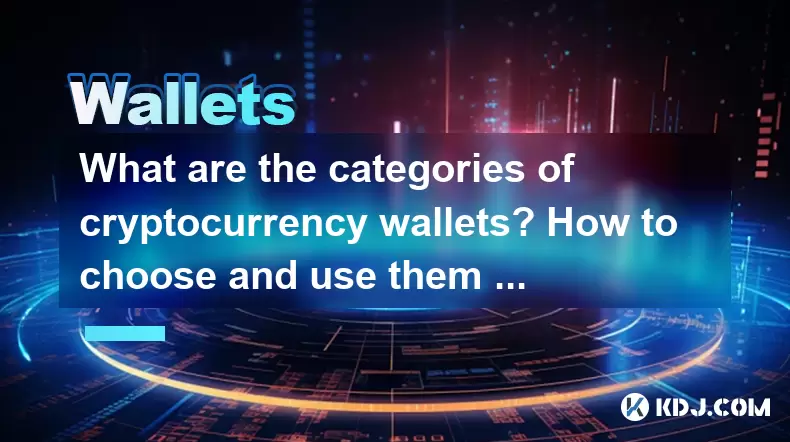
What are the categories of cryptocurrency wallets? How to choose and use them safely?
Jun 21,2025 at 10:42pm
Understanding Cryptocurrency WalletsCryptocurrency wallets are essential tools for anyone involved in the digital asset ecosystem. They allow users to store, send, and receive cryptocurrencies securely. Unlike traditional wallets that hold physical money, crypto wallets manage cryptographic keys—private and public—which interact with blockchain networks...
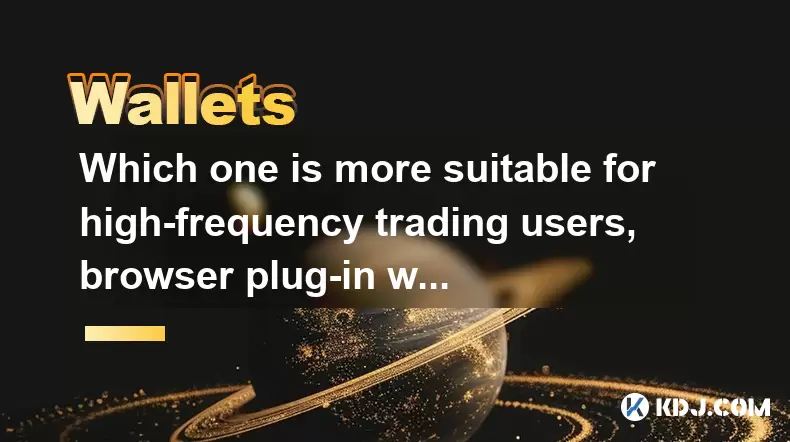
Which one is more suitable for high-frequency trading users, browser plug-in wallets or independent application wallets?
Jun 23,2025 at 08:22am
Understanding the Role of Wallets in High-Frequency TradingFor high-frequency trading (HFT) users in the cryptocurrency market, wallet selection is critical due to the need for speed, security, and seamless integration with trading platforms. HFT involves executing a large number of trades within seconds or even milliseconds, which demands a wallet that...

What are the differences between the operating mechanisms of on-chain wallets and off-chain wallets? Is there a big difference in transaction fees?
Jun 25,2025 at 08:49am
Understanding On-Chain WalletsOn-chain wallets are digital wallets that directly interact with the blockchain network. These wallets store users' private keys, which are essential for signing and authorizing transactions on the blockchain. When using an on-chain wallet, every transaction must be recorded and verified by the decentralized nodes in the ne...
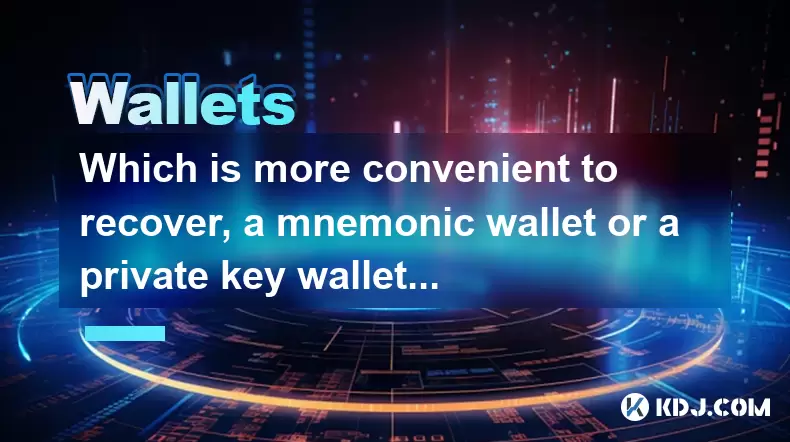
Which is more convenient to recover, a mnemonic wallet or a private key wallet? Will security be compromised?
Jun 20,2025 at 06:36am
Understanding Mnemonic Wallets and Private Key WalletsIn the world of cryptocurrency, wallet recovery is a crucial aspect that users must understand before storing digital assets. Two popular methods for securing and recovering wallets are mnemonic phrases and private keys. Both serve as gateways to access funds, but they differ significantly in terms o...
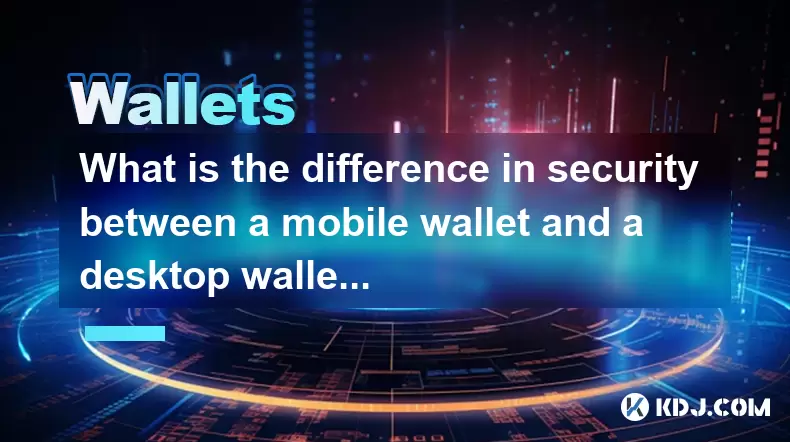
What is the difference in security between a mobile wallet and a desktop wallet?
Jun 22,2025 at 12:35pm
Understanding the Security Aspects of Mobile WalletsMobile wallets are digital wallets designed to run on smartphones, allowing users to store, send, and receive cryptocurrencies conveniently. The security of mobile wallets largely depends on how well the device is protected from malware, phishing attacks, and unauthorized access. One key feature of mob...
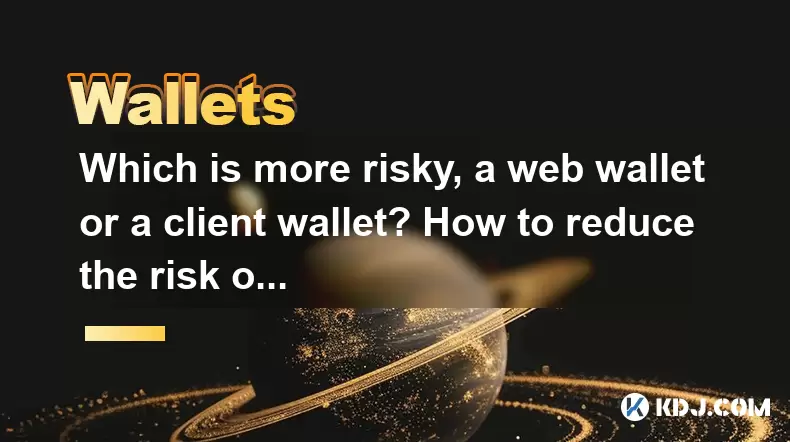
Which is more risky, a web wallet or a client wallet? How to reduce the risk of use?
Jun 22,2025 at 09:21pm
Understanding Web Wallets and Client WalletsWhen managing cryptocurrencies, choosing the right type of wallet is crucial. Web wallets and client wallets are two popular options among users, each with its own set of advantages and disadvantages. A web wallet operates through a browser interface and is usually hosted online by third-party services. This m...

What are the categories of cryptocurrency wallets? How to choose and use them safely?
Jun 21,2025 at 10:42pm
Understanding Cryptocurrency WalletsCryptocurrency wallets are essential tools for anyone involved in the digital asset ecosystem. They allow users to store, send, and receive cryptocurrencies securely. Unlike traditional wallets that hold physical money, crypto wallets manage cryptographic keys—private and public—which interact with blockchain networks...

Which one is more suitable for high-frequency trading users, browser plug-in wallets or independent application wallets?
Jun 23,2025 at 08:22am
Understanding the Role of Wallets in High-Frequency TradingFor high-frequency trading (HFT) users in the cryptocurrency market, wallet selection is critical due to the need for speed, security, and seamless integration with trading platforms. HFT involves executing a large number of trades within seconds or even milliseconds, which demands a wallet that...

What are the differences between the operating mechanisms of on-chain wallets and off-chain wallets? Is there a big difference in transaction fees?
Jun 25,2025 at 08:49am
Understanding On-Chain WalletsOn-chain wallets are digital wallets that directly interact with the blockchain network. These wallets store users' private keys, which are essential for signing and authorizing transactions on the blockchain. When using an on-chain wallet, every transaction must be recorded and verified by the decentralized nodes in the ne...

Which is more convenient to recover, a mnemonic wallet or a private key wallet? Will security be compromised?
Jun 20,2025 at 06:36am
Understanding Mnemonic Wallets and Private Key WalletsIn the world of cryptocurrency, wallet recovery is a crucial aspect that users must understand before storing digital assets. Two popular methods for securing and recovering wallets are mnemonic phrases and private keys. Both serve as gateways to access funds, but they differ significantly in terms o...

What is the difference in security between a mobile wallet and a desktop wallet?
Jun 22,2025 at 12:35pm
Understanding the Security Aspects of Mobile WalletsMobile wallets are digital wallets designed to run on smartphones, allowing users to store, send, and receive cryptocurrencies conveniently. The security of mobile wallets largely depends on how well the device is protected from malware, phishing attacks, and unauthorized access. One key feature of mob...

Which is more risky, a web wallet or a client wallet? How to reduce the risk of use?
Jun 22,2025 at 09:21pm
Understanding Web Wallets and Client WalletsWhen managing cryptocurrencies, choosing the right type of wallet is crucial. Web wallets and client wallets are two popular options among users, each with its own set of advantages and disadvantages. A web wallet operates through a browser interface and is usually hosted online by third-party services. This m...
See all articles























